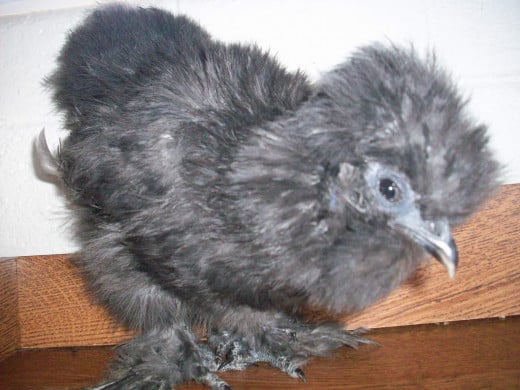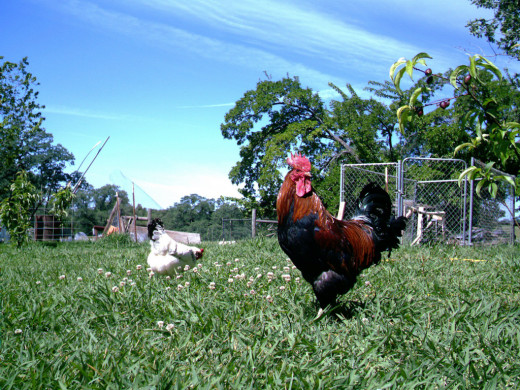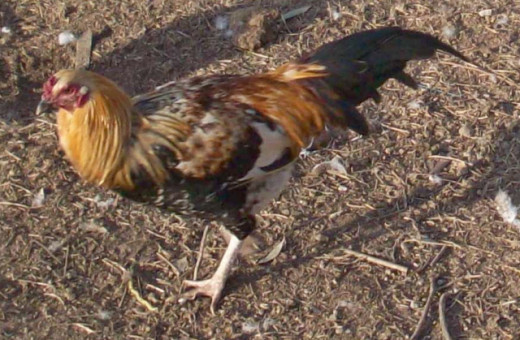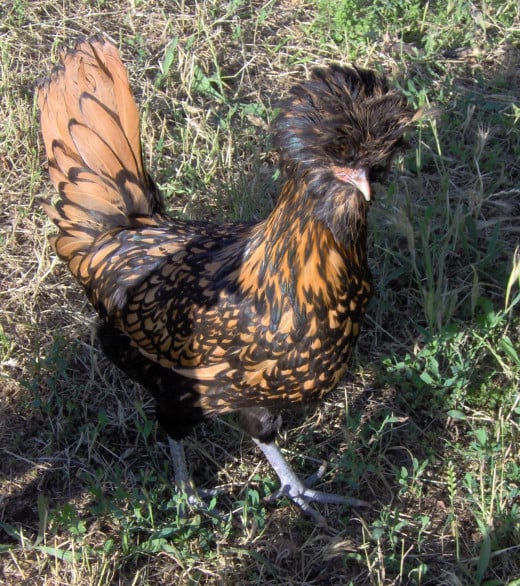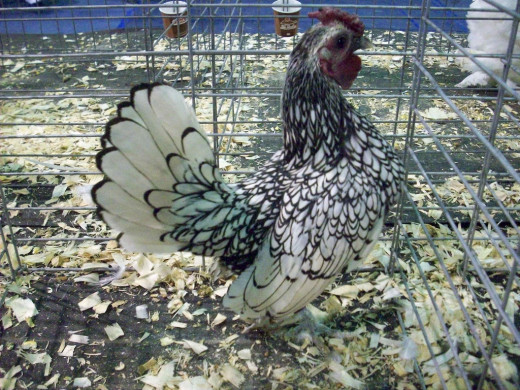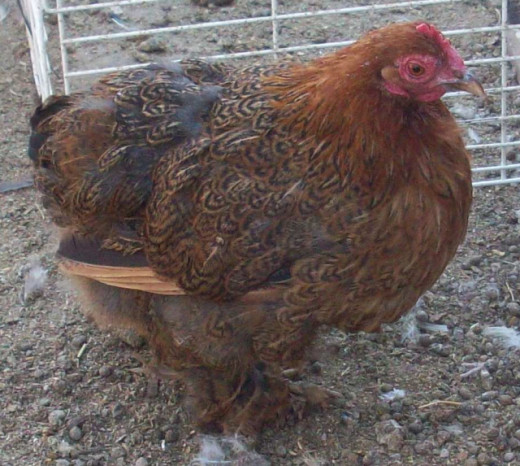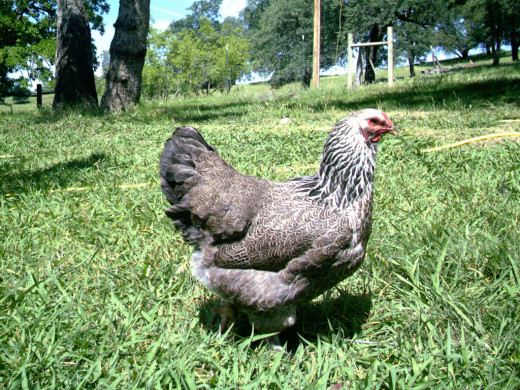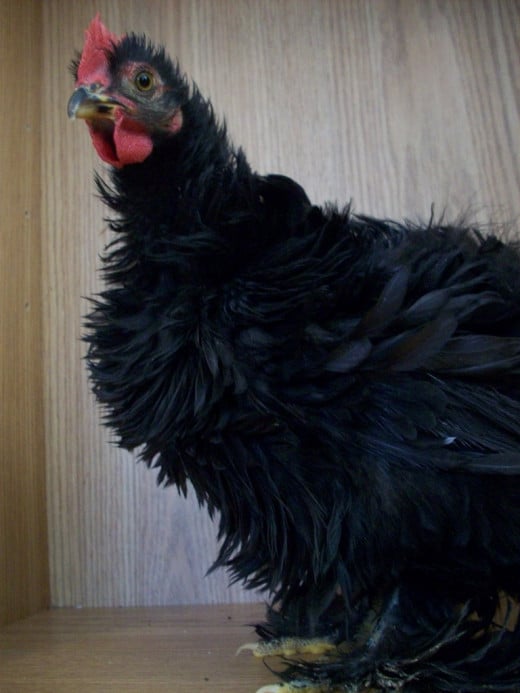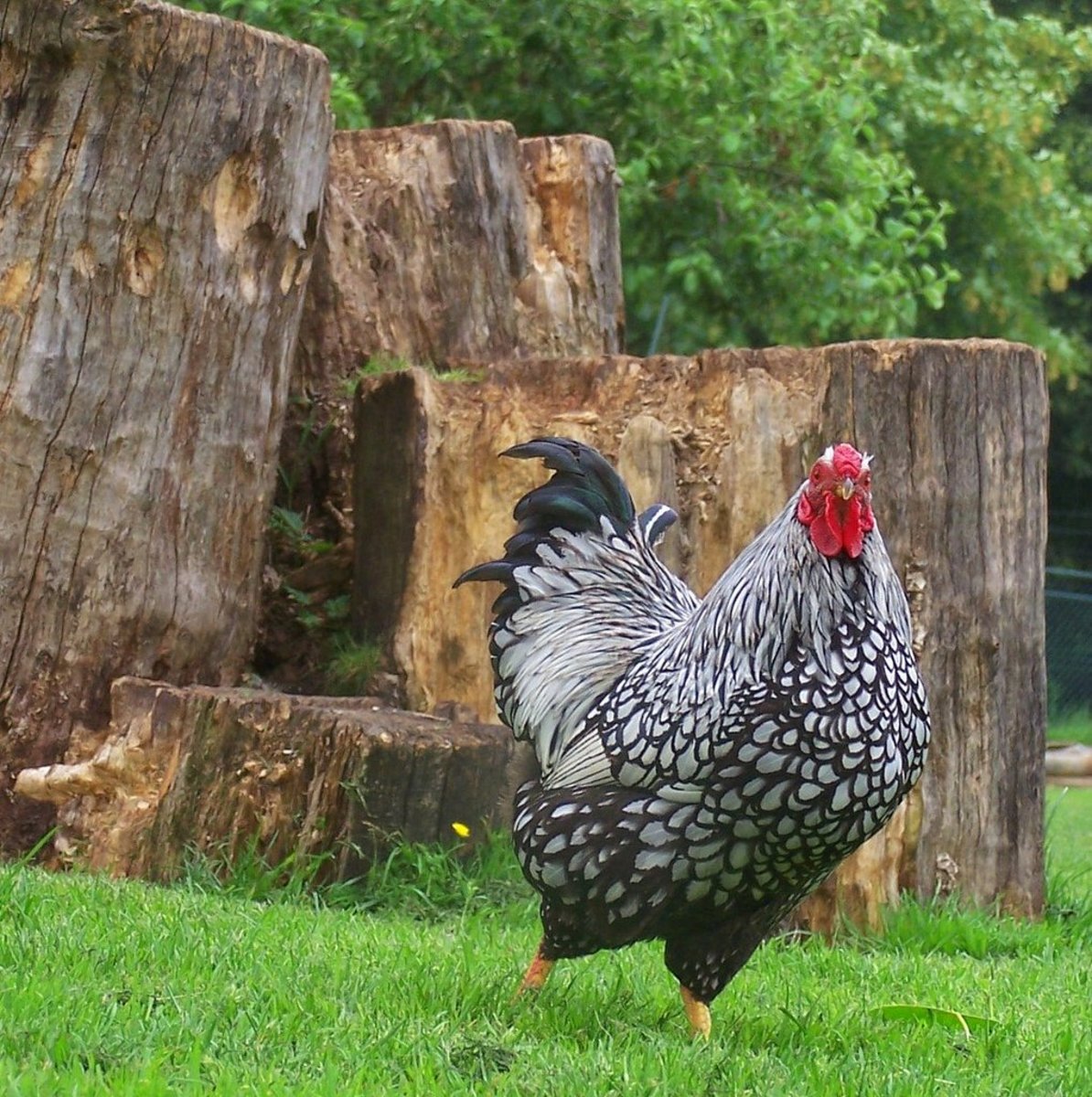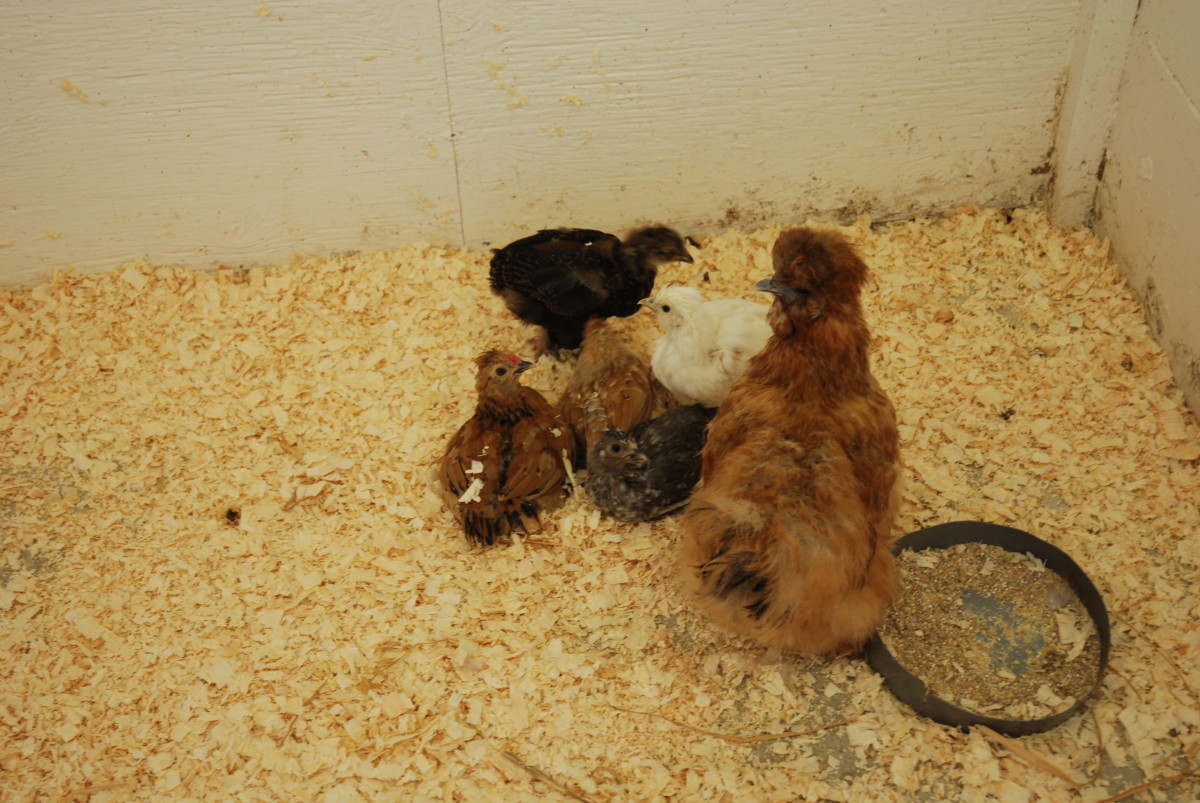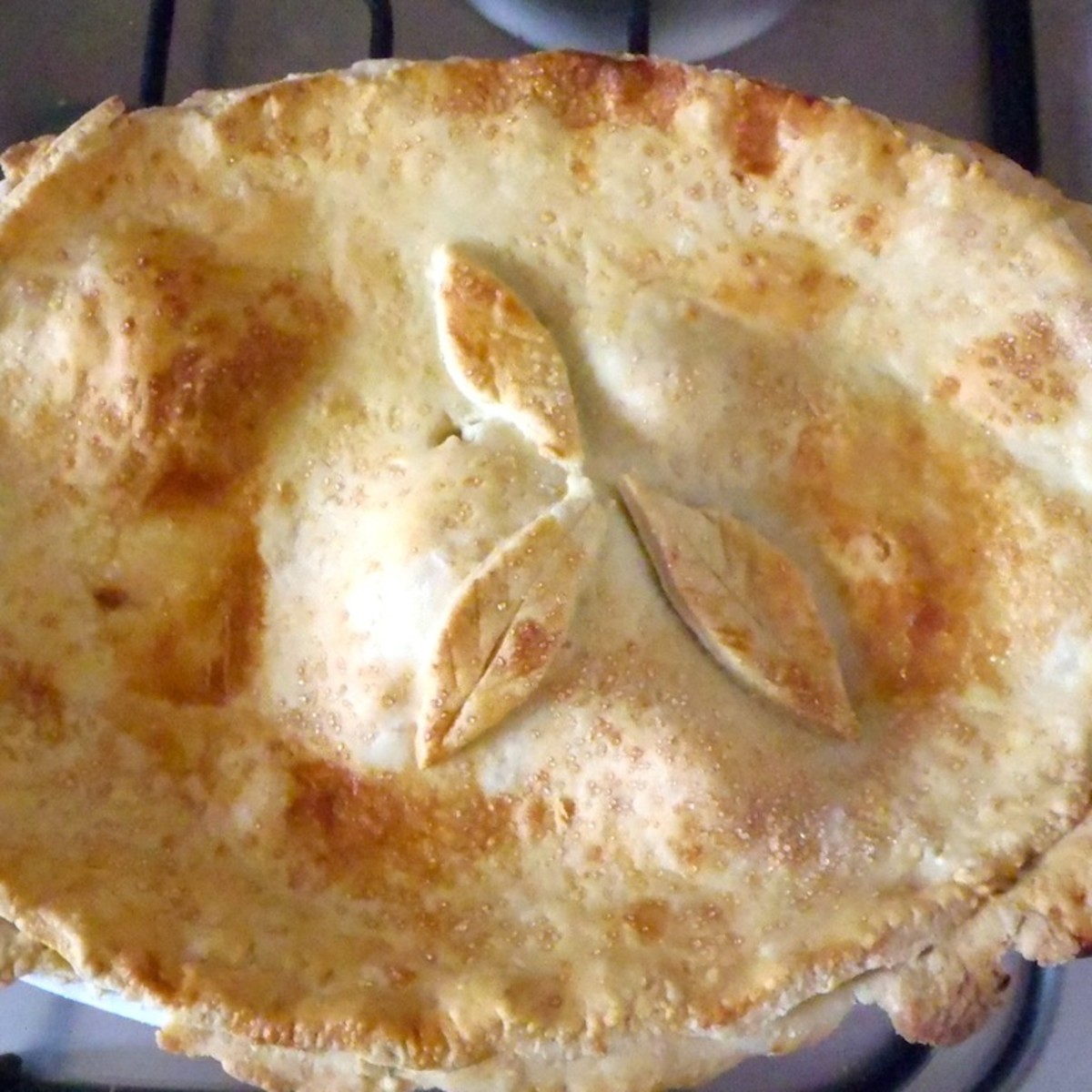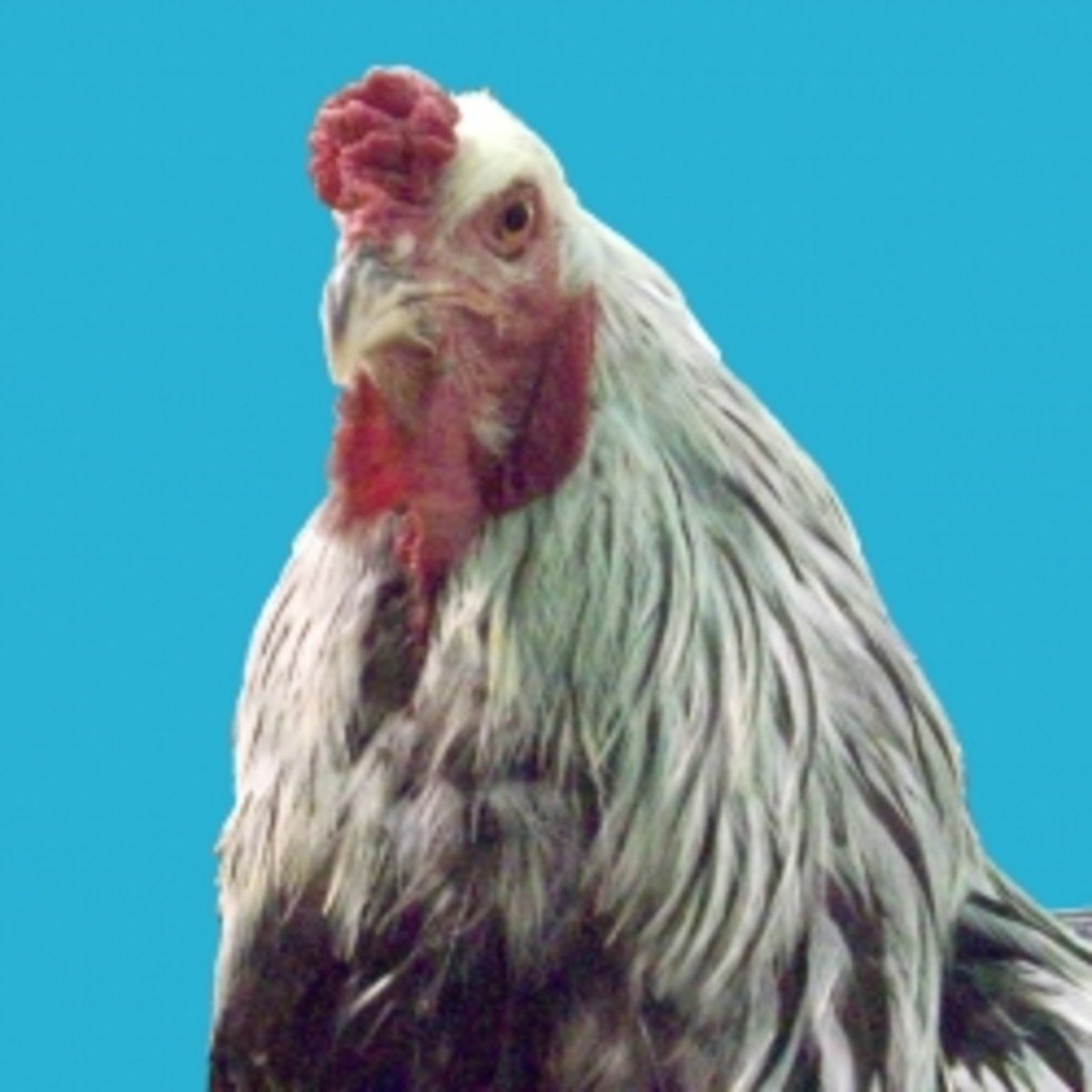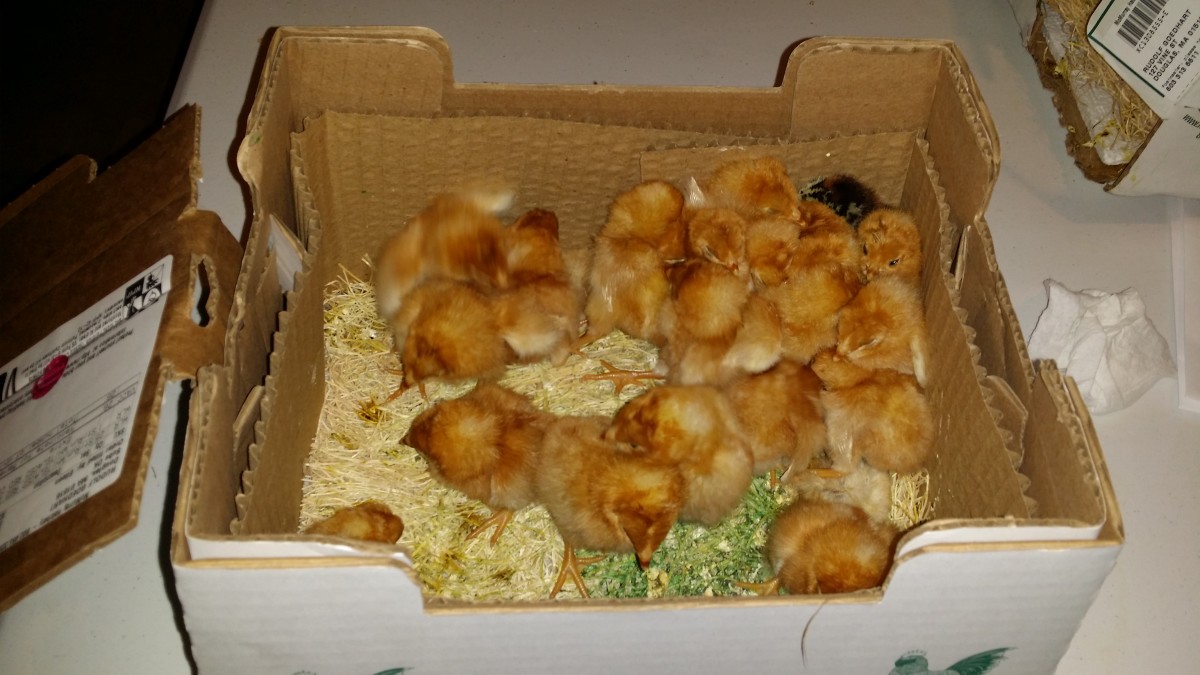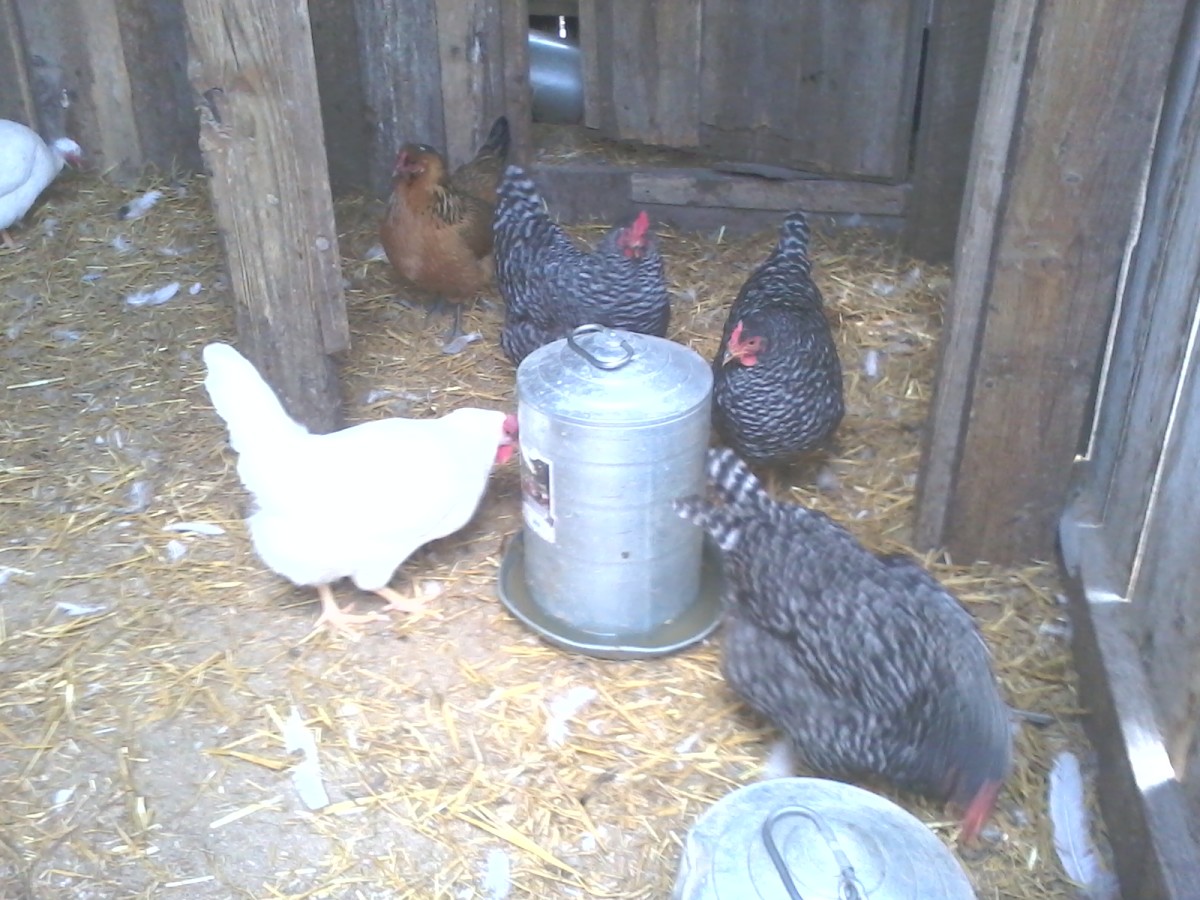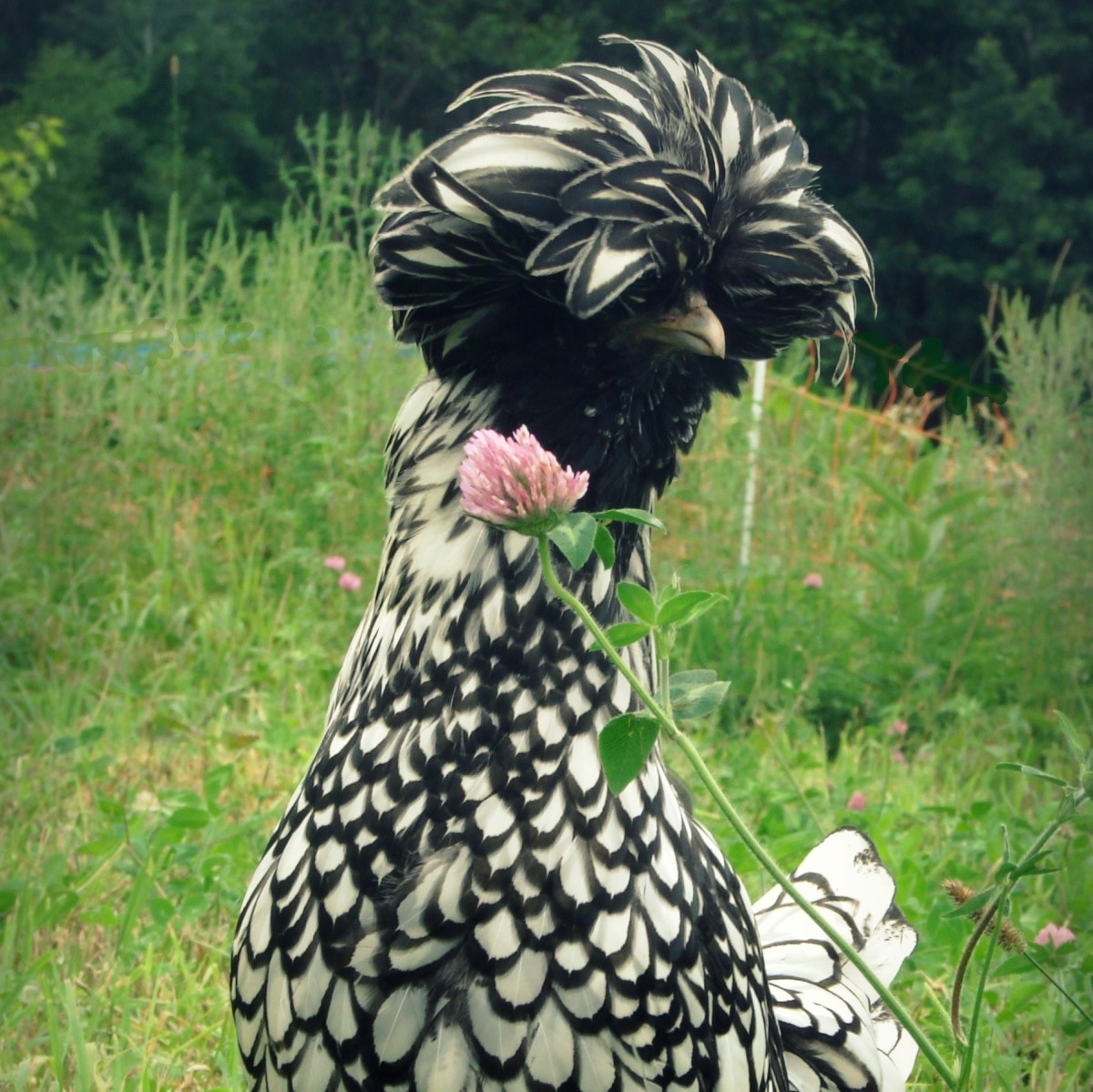11 Reasons You Should Get Chickens
Bantam Rooster
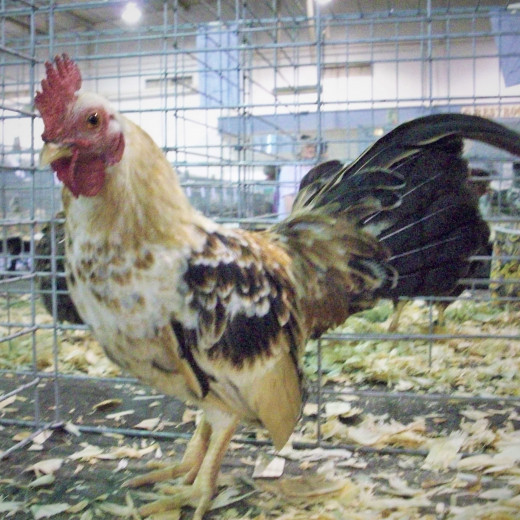
Chickens Are Great
I'm a huge proponent of chickens. Chickens are incredibly useful and fun, and they make great pets. They aren't for everyone, but they are for nearly everyone.
They make eggs and meat, are easy to raise, are lots of fun, and they are helpful gardeners. Often people are amazed at how much personality chickens have, and how enjoyable it is to watch a flock frolic in the sun. Most people have the space and time to have a few hens, and they truly are wonderful.
Lots of Reasons to Keep Chickens
- Homegrown eggs taste better.
- Homegrown eggs are healthier.
- You can raise the chickens in a more humane fashion.
- Chickens eat bugs in the garden.
- Chickens produce fertilizer.
- A variety of eggs is fun.
- Allergies to eggs are less common with homegrown eggs.
- You can raise your own meat.
- It's better for the environment.
- Chickens are beautiful.
- Chickens are fun to watch.
Homegrown Eggs Taste Better
Eggs fresh and raised well taste much, much better than store-bought eggs.
The eggs you get in the store are often older than you think. This makes them taste bland and lose texture. Fresh, homegrown eggs have sturdier, bright orange yolks that stand up straight and steady, and they don't easily burst when you're trying to fry eggs. The whites also are more cohesive. They don't spread out as much, but rather form a nice tight ring around the yolk. This means fresh, homegrown eggs make much better fried eggs.
Homegrown eggs also taste better because they come from chickens who had access to a variety of food. When chickens eat a more natural diet their eggs reflect it. Chickens fed primarily grain end up with eggs that taste blah, while homegrown eggs from chickens with access to greenery and life produce eggs full of bright color and taste.
A Fresh Egg
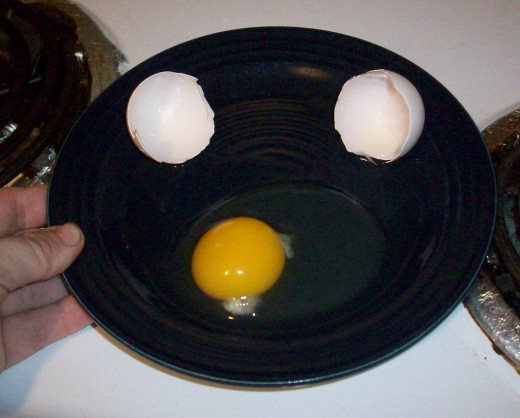
Homegrown Eggs Are Healthier
Homegrown eggs are a lot better for you too. Most store eggs come from chickens fed a poor diet. They are fed to make them produce more eggs, not to have healthy eggs. This means lots of grains, but no vegetables or bugs that would naturally eat.
Chickens that eat kitchen scraps, weeds, and bugs in addition to their feed make eggs bursting with delicious flavor that are much healthier for you and full of omega-3s and vitamins. They also have less bad cholesterol and more good cholesterol, meaning that eating them can actually improve your cholesterol levels.
You can even purposefully improve the vitamin levels in your homegrown eggs by feeding your flock healthy additives such as flax seed, meal worms, brewers yeast, and other health foods.
Eggs are considered a complete food. They have all the essential amino acids necessary for human life and they are chock full of a bunch of good stuff. Chickens fed a variety of food with a natural diet create eggs that satisfying to your body, making them taste better and be better for you.
Homegrown Eggs for Breakfast
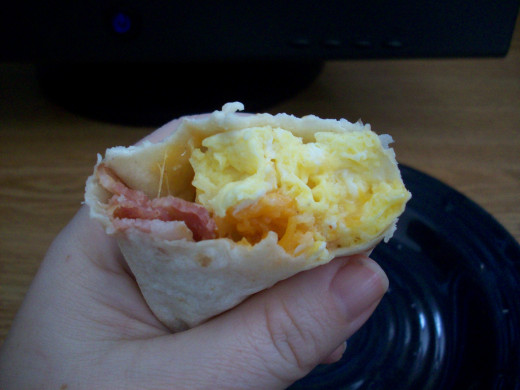
Keeping Chickens is More Humane
You can raise the chickens in a humane fashion. It is very difficult to find chicken eggs or meat that has been raised in a humane fashion. Part of the problem is the corruption of terms.
Antibiotic-free, organic, vegetarian, none of those labels are all that great. They are better than nothing, but they do not mean the chickens were raised with care. Antibiotic-free simply means they weren't fed antibiotics, which in most cases is against the rules for eggs anyways. Organic means they didn't get fed pesticides. Chickens are not naturally vegetarians, so vegetarian-diet eggs mean the chickens weren't allowed to have what they would normally prefer to eat. None of these terms mean the chicken was treated as a living, breathing creature who deserves to live without pain and suffering.
The term free-range means the chickens can go where they will. It does not mean they have the space to go where they naturally would, nor does it mean there is any place for them to go.
Cage-free means the chickens don't live inside those small cages. Sometimes flocks are shoved into small buildings without any access to the outside, in far more cramped conditions than if they were in the egg-laying cages.
Raising your own chickens means you can see how the chickens live and are treated.
If you have to buy eggs, look for ones that come from small, backyard flocks or those from a certified humane or cruelty-free source. Pasture-raised is also a good term since most chickens do very well in a field where they can eat bugs and weeds and act naturally.
Obviously, raising your own chickens is the best way to make sure they come from someone who treats them kindly and with care. And if you raise meat chickens, you can also make sure when their final time comes that they are treated with respect and the final blow is done kindly and carefully.
A Curious Hen
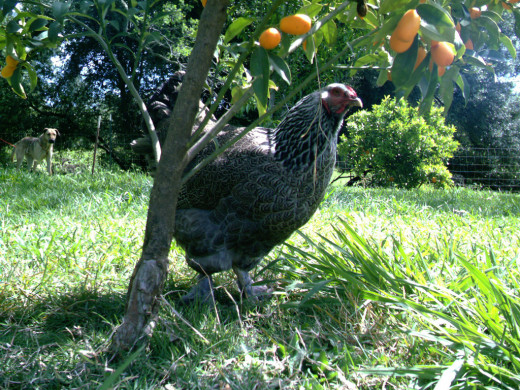
Chickens Eat Bugs in the Garden
Chickens act as natural pest control. They gobble up bugs and even small snakes or mice. Raising chickens adjacent to your garden means you can release them into it to roam and control pests without having to use pesticides.
Chickens will also eat garden produce, so should be used carefully though. Any new sprouts will get eaten and they have a tendency to peck at growing fruit. After the plants are established and you want roaming weed and bug control, the chickens will help you all day long. I also like to release them on the garden during the winter to prevent pests from going out of control while I'm not working there.
Hens Looking for Bugs in the Grass
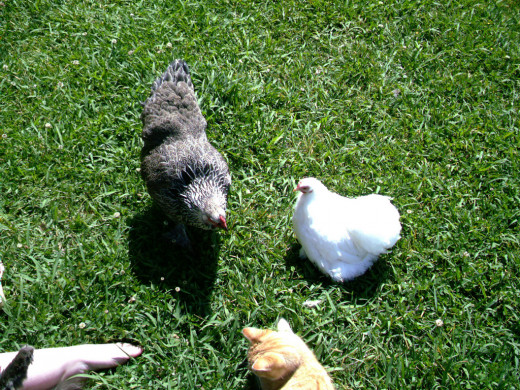
Chickens Produce Fertilizer
Another reason many gardeners like chickens is because they produce fertilizer. That's right, they eat bugs and weeds, then make poop to fertilize where they roam. Chicken poo is high in nitrogen, so should be used carefully, but mixed with bedding from the coop it composts nicely and breaks down quickly.
Free-roaming chickens naturally spread their rich manure around the garden or lawn, which saves a lot of trouble for those who need to fertilize. Some people even create small, portable chicken coops called chicken tractors to move the chickens about the yard so their poop is placed where it's needed most.
Fertilizing the Lawn
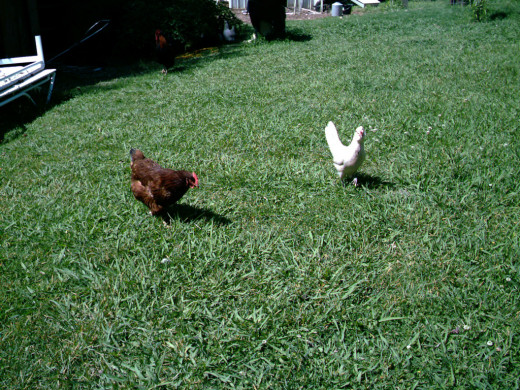
A Variety of Eggs is Fun
One of my favorite things about keeping chickens is the variety of eggs. Row after row of white eggs, all the same size and coming from the same breed of chicken, makes for far less fun.
Each breed of chicken lays different eggs, and each chicken lays unique eggs, which means often you know exactly who laid what egg each time you use them. There's a closeness to the food source that is missing these days.
Chicken eggs primarily come in colors from bright white to chocolate brown, but some can have speckles or freckles on them, some may be oddly shaped or a weird size. Bantams are small chickens that lay small eggs, some super small, some medium. Some hybrid layers lay double-yolk eggs or just enormous ones. And some breeds of chickens even lay naturally colored eggs in shades of blue, green, olive, pink, or purple.
Having your own chickens makes for a fun variety every day.
Nature's Easter Eggs
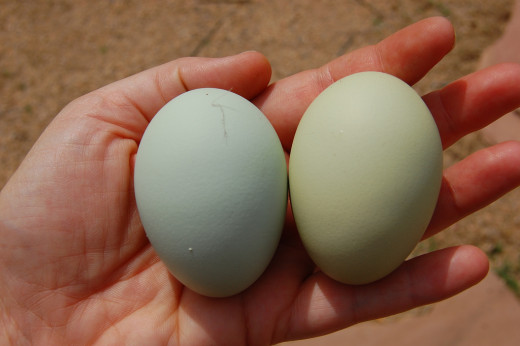
Click the Link Below to Learn More About Chicken Egg Colors
- Nature's Easter Eggs
Chicken eggs come in lots of different colors, not just brown and white. I call these colored eggs, nature's Easter eggs since it seems like nature decorated them for us already. Plain white ones are so bland when you can have blue, green, or purple.
Backyard Chickens Are Lovely
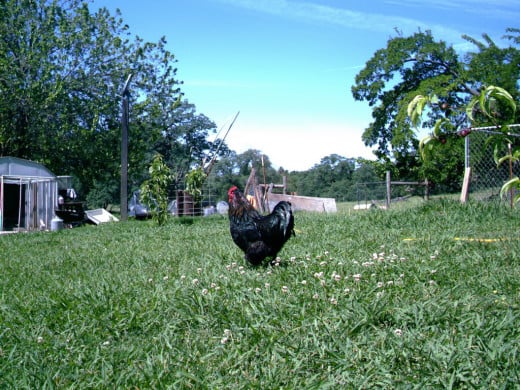
Homegrown Eggs Trigger Less Allergies
People with allergies to eggs may be able to eat homegrown eggs.
Marigold petals are a common inclusion in chicken feed. They make the egg yolks more yellow, instead of the pale, lackluster color the low-nutrient eggs would have otherwise. This makes them more appealing to consumers. Homegrown eggs often have bright yellow yolks naturally because of all the vitamins present in homegrown eggs and the weeds and bugs the chickens eat.
It is possible to buy chicken feed that does not have marigold petals in it, and so many people who cannot eat eggs because of allergies can eat homegrown ones.
Homegrown Eggs To Trigger Less Allergies
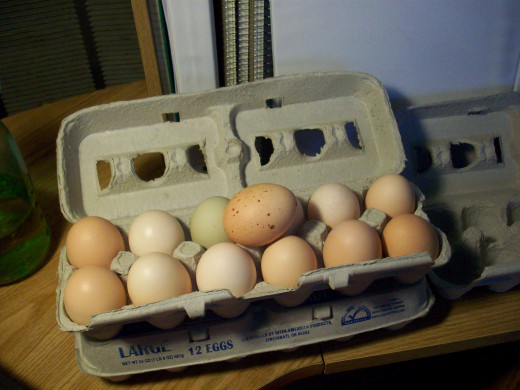
You Can Raise Your Own Meat
Many people are getting more concerned with self-sufficiency and living off the grid. Keeping chickens is a great way to do just that.
Chickens are one of the easiest types of livestock to raise. They are cheap and easy, grow quickly and don't take a lot of room. Nearly anyone can handle them, and when it comes time to butcher you don't need heavy equipment, just some simply supplies.
With bigger livestock such as goats or cows, you need to freeze anything you won't use right away. That's fine when you have a plentiful supply of electricity and the space, but with chickens you can instead harvest one when you need it.
Meat chickens have been forced to evolve into being fast-growing, and they use food well. They generally have one of the best ratios of food to meat. This makes them really good for the small farmer. With the right conditions and breeds, it's only a few months to a freezer full of meat.
An Extra Rooster
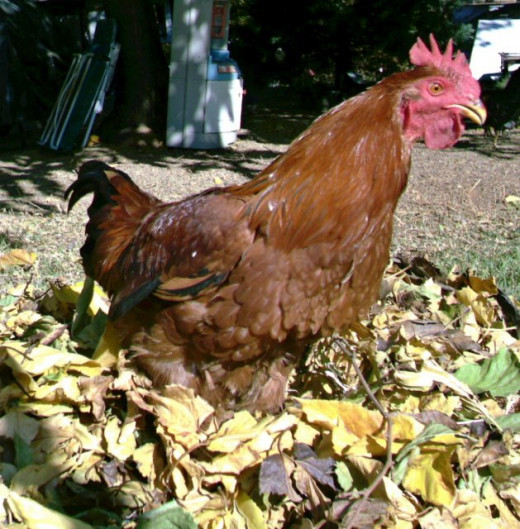
Keeping Chickens Helps the Environment
Keeping chickens helps keep food local. Instead of buying eggs from another state that have to be trucked in, raise your own. Feed will still need to be trucked about, but many people even attempt to raise that too, or at least enough to offset it. It's much better to go out into your yard and pick up fresh eggs, instead of getting eggs from the supermarket that have come from who knows where.
Not all that food you throw away is trash, chickens are great at eating up lots of kitchen scraps. They will eat nearly anything except for potato peels and onion skins. Most people also recommend against feeding them meat as well, since it can attract pests and some people find it unnatural. Chickens are nearly scavengers, so will try to eat almost anything you leave lying around. It's great to prevent waste and instead have kitchen leftovers get turned into fresh eggs.
Chooks will also improve your compost pile. They'll dig through it, finding goodies and adding in air and fertilizer, while they stir it up. Chickens and compost piles are a match made in heaven.
A Flock of Chickens Being Natural and Eating Kitchen Scraps
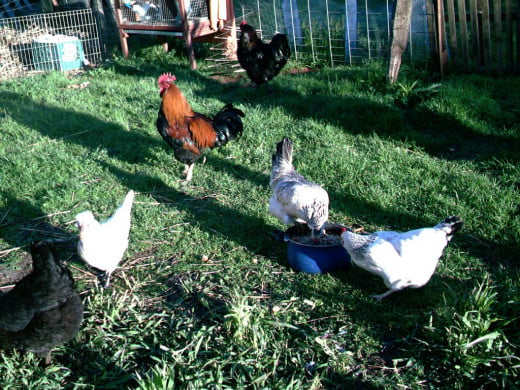
Chickens Are Beautiful
We often don't think of chickens as beautiful, but chickens come in a huge variety of colors, shapes, and patterns. Many of them are incredibly beautiful. Chicken fanciers often call their flocks 'eye candy' because they look so stunning parading about.
The Phoenix breed of chickens have long, long, long tails. These tails can be many feet long and continue growing. Most people raising chickens at home won't be able to get the perfect tails of the ornamental versions, but even homegrown birds can have pretty dancing feathers.
Sebrights are tiny chickens that most commonly come in Silver-Laced and Golden-Laced versions. The details on each feather are incredibly precise and perfect, making these tiny birds stunning.
Sumatras have long, low tails that hang far out behind them like a train. My flock of beautiful, solid-black Sumatras on my green, green grass is still one of the prettiest things I've ever seen.
Many feather patterns that are pretty are found in different breeds. The frizzle gene makes a chicken's feathers curl out and they are breeding that trait into several breeds, most commonly Cochins and Polish-Cresteds. Silver-Laced means the feathers are multi-color, both silver and black and each feather is laced with color in a certain pattern. Gold-Laced means the same, but in gold.
There are speckled chickens, barred, creole, spangled, mille fleur, and a huge variety of colors including red, blue, gray, silver, brown, black, white, cream, porcelain, lemon, birchen, and wheaten. Chickens come in nearly every color and pattern you can imagine.
Most types of chickens are pretty in their own ways, whether body shapes, feather patterns, or just cuteness. I love having a mixed flock of different breeds, all looking grand and and pretty on the lawn.
Beautiful Chickens
Click thumbnail to view full-size






Click On the Links Below to Learn More About Chicken Breeds
- Cochins: The Round, Fluffy Chickens
Cochins come in both bantam and standard sizes and have feathered legs and huge, fluffy butts. They look like bowling balls sometimes. They come in a variety of colors and patterns, and even frizzled, which means they can have curly feathers - Silkies: The Furry Chickens
Silkie chickens are small and look like they have fur. But really, their feathers are just strange. They are fluffy and soft and cute. I often joke that they're house slippers with beaks. Or sometimes I get really silly and tell people they're rabbit - Polish Crested Chickens
Polish Crested chickens have ornate crests and upright bodies. Roosters have ragged, spiky crests, while hens have smooth bobs. They come in a variety of feather colors and patterns, and even frizzled and naked neck versions.
Check Out Amazing Chickens

Chickens Are Fun to Watch
Many people call their flocks chicken tv. Sounds weird, right? But sitting and watching the flock peck and frolic about the yard is incredibly interesting, and at the same time, soothing.
Chickens make a huge variety of noises, some funny, some obnoxious, some simply interesting. I know people who have their cute clucks and chitterings recorded, so they can listen to them instead of a white noise machine.
Their behaviors are fun too. Chickens like to wander the yard, looking for tidbits of tasty food and nice, juicy bugs. They scratch a little, then peck, then amble, then repeat. It all ends up making a therapeutic thing to watch.
Chicken Flock Video
The video below shows many different types of chickens all ambling about the yard. Included in the mixed flock are (click on the links to get more information on those breeds):
- Bantam Black Frizzle Cochin Rooster
- Black Cochin Hen
- Silver-Laced Polish Crested Hen
- Rhode Island Red Hen
- Dominique Hen
- Non-Bearded White Silkie Hen
- Silver-Laced Wyandotte Hen
- Golden-Laced Wyandotte Hens
- Buff Ameraucana Hen
- White Ameraucana Hen
- White Leghorn Hen
- Bantam Old English Game Hen
- Mallard Duck
A Mixed Flock Playing in the Yard
Lots of Reasons to Keep Chickens
What Do You Think Is the Best Reason to Keep Chickens?
Ready for Chickens, Now?
